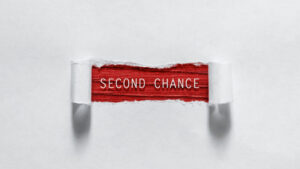Posts by Guest
We’re thrilled to have returning guest Danielle Davis on Writer Unboxed today! Danielle has had dark fantasy and horror published in Andromeda Spaceways Magazine, The Astounding Outpost, and multiple anthologies. You can find her on most social media under the handle “LiteraryEllyMay” and at her website, literaryellymay.com
It’s Not Me, It’s the Story
Have you ever reached a point where you couldn’t see the path forward while writing your story, and found yourself saying, “What is wrong with me?” It’s an easy trap to fall into, to see our stories as a projection of ourselves and to equate our story’s perceived value with an internal sense of worth. We put so much of ourselves into our writing that it’s a natural tendency to create an inflated sense of connection between the two and to take it personally when the story doesn’t want to work the way we want it to. This, in turn, drains motivation and makes it hard to move past those negative feelings.
In her TED Talk, “Teach Girls Bravery, Not Perfection,” Reshma Saujani provides the anecdote of a friend who is an instructor at the University of Columbia. During office hours with his computer science students, he noted that men struggling with an assignment would say, “Professor, there’s something wrong with my code.” But when the women came in, they said, “Professor, there’s something wrong with me.”
This resonated with me. I, too, struggle with the culture that Saujani coins “perfection or bust” when I’m working on a story. I often beat myself up about not being further along as an author or tell myself that it’s a personal failing on my part. I tell myself that mine are pipe dreams and I’m just not cut out for this work. It’s a pervasive thought, that you aren’t enough, and if you’re not careful, it can fester and grow into a writer’s block that sticks.
Not too long ago, after wrestling with a sudden dead-end in my WIP, I went to my husband and lamented, “It’s not working out. I think I’m just not the writer for this story.” He very quickly (and correctly) called me out about it. Talking with him made me realize that it wasn’t ME. I wasn’t the failure. Elements in my story needed to be improved. A few tears and several days later, I realized what wasn’t working and made the necessary corrections. And it began to move again.
In the process, I began to identify several ways to fight that sense of personal failure and inadequacy:
Read More
Please welcome author-in-progress Kristina Stevens to Writer Unboxed today! We were approached by WU contributor Jim Dempsey about Kristina’s journey, which has involved writing a novel that began as a memoir. How did she decide on that change? What did that change entail? And would we be interested in sharing the journey (yes!).
More about Kristina from her bio:
You can learn more about Kristina by following her on Twitter @kriss_outsider.
How Do You Adapt Real Life Into Fiction?
“All this happened, more or less.”
This is the opening line to Kurt Vonnegut’s Slaughterhouse-Five. The novel is a semi-autobiographical account of the bombing of Dresden by the Allied Forces in 1945. Anyone familiar with Slaughterhouse-Five, however, would struggle to define it as realistic or true to life. The novel contains time travel and alien abduction, not things that you would believe “happened, more or less.”
So although we can safely say that Slaughterhouse-Five is not a factual account of the author’s experience of war, it does contain truth, or rather Truth. Slaughterhouse-Five disrupts the traditional structure of the novel, and the often chaotic form of the chapters reflects Billy Pilgrim’s frame of mind, his trauma resulting from the Dresden air raids. The narrative is non-linear and scenes describing the bombing can present as incoherent. This confusion and futility is the ultimate metaphor of war and its horror.
Memoir or Fiction?
When I started writing, I wasn’t sure if I should write in the form of memoir or fiction, but I settled on memoir. I believed memoir would have the most impact as there nothing more powerful than literal truth. In this world of “fake news” and spin, I felt that to tell my story I had to be painfully honest and adhere doggedly to fact. However, through the process of writing, I have learned that honesty and truth can be conveyed sometimes more effectively and potently through storytelling and metaphor.
You might have noticed that I called my writing ‘my story’, but that changed as the story itself became more important than my place or ego within that. Memoir is by its nature an account of an experience or experiences as interpreted by the author. However, the more I wrote, the more I felt myself being pushed out the story. I wasn’t at the centre of it, rather it was developing its own volition. I thought I was writing about specific themes and ideas, but I began to see that the story was asking its own question: Where do I belong?
I realised that question was central to everything and had to be explored; it was the essence of what I was trying to say. The day-to-day factually correct record of events and conversations became unimportant, even irrelevant. As I started to write, this concept of ‘Where do I belong’ began to grow more powerful, and I knew that in order […]
Read MoreRecently, multi-published author and long-time Writer Unboxed reader Leslie Budewitz reached out to share her experience after reading one of David Corbett’s posts here at WU. David’s words inspired an opening for her, which led to a breakthrough in her process. Could she share what she’d written? Of course, yes. After reading Leslie’s wonderful essay, how could we resist publishing it here? I think you’ll agree it is generous and empowering. Our thanks to Leslie for sharing!
More about Leslie from her bio:
Leslie Budewitz blends her passion for food, great mysteries, and the Northwest in two cozy mystery series, the Spice Shop mysteries set in Seattle’s Pike Place Market, and the Food Lovers’ Village mysteries, set in NW Montana. The latest is Carried to the Grave and Other Stories: A Food Lovers’ Village Mystery (May 2021). As Alicia Beckman, she writes moody suspense, beginning with Bitterroot Lake (April 2021) and continuing with Blind Faith (October 2022). A three-time Agatha-Award winner, she is a past president of Sisters in Crime and a current board member of Mystery Writers of America. She lives in northwest Montana with her husband, a musician and doctor of natural medicine, and their gray tuxedo cat.
Learn even more about Leslie and her work on her website, and by following her on Facebook and Instagram.
When I read David Corbett’s post on the difficulty of writing these days, “Distraction, Focus, Silence,” it came at the end of a week in which I had managed to get to the novel in progress every day, but never for very long. I’d revised a few pages, finished a chapter, started a new one. But I couldn’t focus and I was seriously unhappy about it. To see a friend confess his struggles was both disheartening and reassuring.
Then I read the comments. What struck me were the quotes that boil down to this: We let ourselves be distracted from the work because the work makes us uncomfortable.
Bingo! I’d long realized I tend to leave the page when I don’t know what happens next. All too often, a brief break becomes a long one. To overcome that, I’d devised a strategy of leaving my desk but keeping the story problem consciously in mind. And it worked. The kitchen sink would barely be half full of water when the answer would bubble up and I’d have to dash upstairs to make a few notes before finishing the dishes.
In the current season of distraction, though, that wasn’t working. You have to stay on the page long enough to run into the sticky situation for the unsticking solutions to work.
I wrote two books in 2020, and another book and a pair of short stories in 2021. I’ve had three books come out since the pandemic began and have two coming out in 2022. Why, after working steadily through the shutdown, two summers of wildfires and smoke (we live in the woods in the Northern Rockies), the political and social turmoil, am I struggling now? When we got Covid in November 2020, I took two weeks off, then picked right back up and finished the WIP. (Oh, the advantage of […]
Read MorePlease welcome author and community member Tom Pope back to WU today! Tom was a singer/songerwriter in Hollywood for twenty years before turning to novels. His second novel The Trouble with Wisdom is a cross-genre tale, being compared to a union of McCarthy’s The Road and Mattiessen’s The Snow Leopard, a dystopian story that gives rise to hope. It launches this Tuesday, 2/22/22. A prolific guy, Tom has four more novels in the pipe line.
We’re thrilled that he’s here today to bring us a provocation about hope, fear, and creation.
Learn more about Tom and his novels on his website, and by following him on Facebook and Twitter.
Joan Didion’s passing reminded me that after no one pronounced my first book brilliant, trendsetting, and sure to meet with fabled destiny, I realized I was slouching toward Neverland and quit writing for good.
It may surprise you that the next books I wrote in spite of my commitment to join the circus to avoid writing also sucked. My secret is: angst and self-contempt make for wonderful inspiration to get to the writing nook, so in my spare time I hone them to a sharp edge. In addition, ruinous doubt has proved to be a powerful enhancement for doing my best work. . .
. . . Said no author ever.
The Place of Dopamine
According to endocrinology and other scientific disciplines I can’t pronounce, success—such as landing a publishing deal—triggers dopamine response, which fuels happiness. But before you run too far with that, consider that eating food, sleeping well, and taking a bath produce the same result.
In the interest of personal and community care, as authors, let’s lay the cards on the table. 1) Writing involves nearly endless intricacies of the highest form of human cognition along with the mastery of many particular skills. Only the initial aspects of these capacities can be taught. Sharpening them is up to us. 2) The fabrication is time consuming. 3) Underlying each stage of writing lies a barely understood ability of mind—the creative process. Let’s take a moment to acknowledge the challenging landscape we work in.
The publishing industry, on the other hand, is not particularly interested in these things, including our dopamine response. So why would we—except under threat of death—surrender our symbiotic relationship with it in favor of taking a fused subordinate position if doing so weakens our passion to write, the quality of the work, and most importantly our ability to live happy and fulfilling lives . . . which can enhance our writing?
Earth, Sky, and Sales
Regarding creativity, consider each of us is bound by the parameters of the soil from which our creative process springs; things like our culture, country and history, our education and dwelling situation, and our health, backstory and gender. These conditions shape the stories which arise in the blue sky of our creativity. We cannot create what we cannot conceive.
What universal law, though, says that what we conceive will lie neatly on today’s idiosyncratic commercial path to fame and wealth? AND what axiom states that if our work doesn’t lie neatly there, it is bad? (That some authors solve this problem […]
Read MorePlease welcome author and mentor Katey Schultz to WU today! Katey is the author of Flashes of War, which the Daily Beast praised as an “ambitious and fearless” collection, and Still Come Home, a novel, both published by Loyola University Maryland. Honors for her work include North Carolina’s Sir Walter Raleigh Award for Fiction, the Linda Flowers Literary Award, Doris Betts Fiction Prize, Foreword INDIES Book of the Year award, gold and silver medals from the Military Writers Society of America, the Chicago Writers Association Book of the Year award, five Pushcart nominations, a nomination to Best American Short Stories, National Indies Excellence recognition, and writing fellowships in eight states. Katie is the founder of Maximum Impact, a transformative mentoring service for creative writers that has been recognized by both CNBC and the What Works Network. Learn more at KateySchultz.com.
Getting off the Hamster Wheel
When I was in grad school, I had the luxury of communicating with my advisors every month about craft concerns. When I hit the road for writing residencies and fellowships following graduation, the majority of my support came from mature authors, also in residence. If questions about deep revision or the creative process arose, I usually found an answer just one studio over, and often from someone with the word bestseller in their bio.
Depending on others for advice about my next move on the page was good for me, at the time. I had so many other craft issues to deal with that I had to relinquish some of the biggies to the experts. But this dependency wasn’t sustainable and, furthermore, it wasn’t teaching me to be a better writer on my own. Sure, I could sign up for a workshop or attend a conference, but at the end of the day, I still had to face my own drafts and know what to do and how to do it. At a certain point, other people’s suggestions started to suffocate my sense of joy and turned writing into a checklist of feedback applied, and tools used. I’d “made changes” and “fixed stuff” but my writing also felt…well…dead. Where was the sense of discovery? That feeling that what I had to say, mattered?
I needed a way to get off the hamster wheel of leaning on others for feedback and find confidence and discernment in my own process. And I needed to be able to do this not just for one story, one essay, or one manuscript…but for the rest of my writing life.
Name it
Learning how to coach myself is what finally got me off that hamster wheel, and it took almost a decade for me to leap. Where did I land? In a place of confidence and discernment as a writer, with a deep creative practice that could contain both generative bursts and literary restlessness, all while meeting my goals. How? By identifying the invisible, decision-making moments of my creative processes and applying a unique set of reflections and craft skills to help me determine my own, best, next move.
You might be wondering: If it’s invisible, how did I fix it? The answer is something every writer can relate to. We can fix something only after we’ve named it. Naming […]
Read MorePlease welcome author Annette Nauraine (she/her) to WU today! Annette reached out to us recently after learning more about slavery in the 1700-1800s in Great Britain. It made her wonder about the responsibility that a historical author has to depict those times authentically. From her bio:
Annette’s latest book is Kissing the Kavalier. She is a wife, recovering opera singer, mom of two, Doodle mom. She loves classical music, gardening and gardens, writing, reading, history, opera and dogs. When she has a spare minute, she enjoys period movies and TV series like Versailles and Crown. She spends her time trying to keep ahead of everything life has to offer and enjoying love and laughter.
Learn more about Annette on her website, and follow her on Facebook at annettenauraineauthor.
The Issue of Slavery in Historical Novel Writing
A New Yorker article (Home Truth, by Sam Knight, New Yorker, August 23, 2021) detailed how many of the great English country estates were created by the use of slaves in the West Indian colonies. I was horrified that I never knew this.
As an American, I’m well aware of the history of slavery in the US, but it never occurred to me that all estates for movies and TV shows based on Jane Austen novels, Bridgerton, Brideshead Revisited and stories set in the Georgian and Regency periods, were built and supported by slavery.
In 1807, parliament passed the Abolition of the Slave Trade Act, effective throughout the British empire, but it wasn’t until 1833 that slavery was abolished in British colonies through the Slavery Abolition Act and West Indian slaves obtained their freedom.
About 12.5 million people were transported as slaves from Africa to the Americas and the Caribbean between the 16th century and 1807. When the Slavery Abolition Act was passed, there were 46,000 slave owners in Britain, according to the Slave Compensation Commission, the government body established to evaluate the claims of the slave owners.
Slavery wasn’t on the doorstep of the British because it was kept at a great distance in the West Indies, where slaves were used to harvest staple crops such as indigo, rice, coffee, but most importantly, sugar which was used to make rum. Slave owners were euphemistically called, “West India Merchants,” which disguised their ownership of slaves.
The Slavery Abolition Act of 1833 freed 800,000 Africans who were the legal property of Britain’s slave owners. Contained in the act was a provision of £20m of taxpayer funds to bail out the owners for the loss of their “property.” That sum was 40% of the total government expenditures for 1834. It is the modern equivalent of between £16bn and £17bn. The slaves received nothing, and worse, were compelled to provide 45 hours of unpaid labor each week for their former masters, for a further four years after their supposed liberation, forcing the slaves to buy their own freedom.
Except for books written by few writers of color, these facts, or even characters of color, rarely appear in historical novels. Romances, in particular, involve relationships meant to meet reader expectations. Admittedly, the ugly facts of slavery do little to enhance the fantasy of a plain Jane being plucked from ignominy and rising to the status of a Lady.
However, if writers want to accurately […]
Read MorePlease welcome Lynne Reeves Griffin back to Writer Unboxed today! Lynne Reeves Griffin is an internationally recognized family counselor, public speaker, teacher and writer of fiction and non-fiction. Her work has appeared in Parents, Psychology Today, Solstice Literary Magazine, Chautauqua Journal, Craft Literary, Fiction Writers Review, Brain, Child and more.
Writing as Lynne Griffin, she is the author of the novels, Life Without Summer (St. Martin’s Press), Sea Escape (Simon & Schuster), and Girl Sent Away (SixOneSeven Books).
She writes novels of domestic suspense as Lynne Reeves, with The Dangers of an Ordinary Night published by Crooked Lane Books, available now!
To learn more about Lynne’s work, visit LynneGriffin.com or follow her on Twitter and on Instagram @LynneReevesGriffin.
The Places You’ll Go: Writing Setting or Setting Goals
When I wrote my first novel, I was so preoccupied with getting the psychology of character right that I admit I didn’t pay much attention to place. That’s not to say I ignored it all together. I chose a backdrop of interest and I used setting details to ground the reader ‘in scene.’
Still, it wasn’t until I took a writing class with short story writer and teacher Stace Budzko that I recognized the power of setting to do so much more.
In workshop, Stace guided us to write a scene using only all pleasing telling details. Then we were to rewrite the scene using only all menacing ones.
It was a lightbulb moment for me. I had known that in order for themes to emerge from setting, a story has to, in some way, rely on its setting. But I hadn’t fully considered that place and its unique elements could influence the story such that it would be drastically different, or might not exist at all if it took place somewhere else.
Realizing how underutilized setting was in my first novel, I vowed to course correct for my second. I set a new writing goal: to strengthen my ability to write place. Since setting comes alive in its details and in the way the character experiences the environment, I decided to push my abilities by making a house, in effect, a character.
I played with the questions: What if a home in the story has its own persona? A vibe it gives off that creates story conflict between two characters? By setting a story goal that was also a writing challenge, it was my hope that I’d see setting differently, while also learning to write more nuanced prose. Dear writer, I’m here to tell you, this writing goal enlivened the process of crafting this new story. So much so, that now, in addition to writing novels that explore new psychological phenomena, I also set craft goals specific to each novel I write.
“It’s the job of the writer to create a world that entices you in and shows you what’s at stake there.” —Nancy Huddleston Packer
For my third novel, I aimed to strengthen my ability to write a story with high stakes and crackling tension. I wrote about what I learned about building tension in fiction on the macro and micro level for Writer Unboxed.
Read MorePlease welcome back award-winner author Alma Katsu for today’s post! Alma is the author of six novels, including historical horror (The Hunger) and spy thrillers (Red Widow).
At our invitation, Alma is here to talk about what it means when your novel is reissued–something she is experiencing right now. Her debut, The Taker, was a Booklist top ten debut when it came out in 2011 and was reissued by Gallery Books this year. The Reckoning, the second book in the trilogy, was reissued on September 14. Enjoy!
What to Expect When Your Novel is Reissued
Congratulations! One of your earlier books is being reissued. What should you expect?
Reissues happen all the time, of course, usually for a book that’s been unavailable for a while. Often, it’s released with new material, whether a new cover or afterword. For instance, an older book may come out with a new foreword that puts the book in a cultural or historic perspective. Sometimes they’re given a new, more modern title.
I learned last year that my former publisher was going to reissue my first three books, the first of which was published in 2011. Since the Taker trilogy, I’d moved to a new publisher. Word that the trilogy was going to be reissued came out of the blue, a pleasant surprise and not one I’d anticipated.
What does it mean for me, the author? Foremost, it’s the chance to get the books in front of readers again. They’ve been out of print for a few years. The most exciting part for me are new covers. A new cover gives you the chance to generate some excitement and attract readers who maybe didn’t hear of the book the first time around. We all know how important covers are to book sales. I was never thrilled with the covers for these books, to be frank. It’s not the publisher’s fault: it was hard to capture the essence of books, which are cross-genre. The new covers—at least for The Taker and the second book, The Reckoning, which was re-released on September 14—are much better, I think. They convey the books’ sense of the fantastical and the Gothic.
Read MorePlease welcome Denise Willson back to WU. Dee is an award-winning author, professional editor, author coach, entrepreneur, and a old friend of this community. She’s worked with publishers, authors, and professionals around the world. You can find her at her website, here. Great having you back, Dee!
Research, in regards to writing a manuscript, is like sex. Some love it, some hate it, but we all need it, or our species—along with our stories—will die a wretched death. Don’t believe me? Do your research. You’ll be surprised what you learn.
Research by definition is the collection of information. It’s studious inquiry, learning, and the search for knowledge. Without research, there would be no innovation or advancement, no understanding of the past, the present, or the future. Without investigative skills, mankind would be wiped out by disease, famine, war, nature in all its fury, or a simple microscopic bug. You get the picture—species over. (Oh boy, I’m sensing a theme here.)
We gather information in many different ways. We pose questions to those around us in search of answers. How did you do that? Why is that moving? We spy on neighbors and passersby. Isn’t he married? We turn to experts. Should this be red and oozing? We read an endless stream of books, articles, posts, reports . . . We watch movies, videos, and tutorials. We listen to our elder’s stories. That boy who cried wolf . . . well, we know how that ends. The list goes on. We analyze data, note odds and statistics, and create more questions. And the search isn’t always external. Some of us burrow into the recesses of our subconscious, our heart, or our core. Why am I afraid? What will happen if I reveal this part of me?
The manuscript . . .
As fiction writers, we create stories from our minds. We conjure characters from thin air and weave backstory like talented lace-makers. Our stories take place in cities we’ve lived in, places we’d like to see, and worlds beyond our imagination. Plots are spun on the back of memories, experiences, and dreams.
So, where does research fit in? While it’s true that historical and memoir writers couldn’t manage without research, and I’ve never seen a nonfiction manuscript that didn’t benefit from researching gaps in logic or an unexplored perspective, why does the average writer need research to survive?
Well, for one, because research is a cure.
The cure . . .
As a professional editor, I see writers at every stage of the craft suffer from writing ailments. Some are subtle, a mere tickle in the back of the throat. Others hit like the fist of a superbug. (Is that a word? I’ll have to research it.) So, how do you crawl from these depths? By drinking the sweet elixir of research, of course!
Research is the cure for all that ails you. Struggling with a sticky element of the craft? Do your homework, your research. In addition to books written by your favorite writing gurus, online writing advice can get you out of any pickle. Need a second opinion or detail beyond your scope? The world is filled with writers and experts with secrets to share. Is your manuscript […]
Read MorePlease welcome back former contributor and friend to Writer Unboxed today, Allison Larkin! Allison is the internationally bestselling author of the novels Stay, Why Can’t I Be You, and Swimming for Sunlight. Her short fiction has been published in the Summerset Review and Slice, and nonfiction in the anthologies, I’m Not the Biggest Bitch in This Relationship and Writer Unboxed’s own book, Author in Progress.
Allison’s latest novel, The People We Keep, releases today! Several of us have been lucky enough to read advance copies and can attest that it’s a beautiful coming-of-age story, and the buzz over it is well-deserved. Said Booklist in their review of the book: “Larkin has created a memorable character in April, whose journey toward belonging and self-acceptance will resonate with readers. The depiction of the mid-1990s is pitch-perfect and will invoke feelings of nostalgia, especially in Gen Xers who came of age during this era. Fans of Caitlin Moran’s How to Build a Girl will enjoy traveling alongside April.” —Booklist (starred review)
We’re so glad she’s with us today to explain how The People We Keep, a book that simmered and stewed with Allison for over 15 years, evolved as she did. Learn more about it on her website, and by following her on Twitter.
Don’t Finish Your Book
I first met April Sawicki in 2006 while I was writing a different book. Two songs on my playlist shuffled together managed to jostle something in my brain, and suddenly, there was April, taking up my full attention. It felt like she was flashing in my mind, calling, “Over here! Over here! I need you!”
She was nineteen and wily. She observed carefully and felt deeply, but few of the constellations of thoughts in her mind ever came out of her mouth. She played guitar and traveled. She wanted a home, but staying in one place would mean she’d eventually have to face herself, and that was terrifying.
I tried to get back to the book I was already writing about a woman named Van and a dog named Joe, but April wasn’t going to leave me alone. I didn’t want her to. I was fascinated. I wrote down everything I could about her. When I reached the end of those ideas, I asked myself questions about what happened before that and realized her story needed to start when she was sixteen. I did eventually get back to that novel about Van and Joe. I finished it, and it became my first book, but April never stopped calling to me.
Today is the pub day for THE PEOPLE WE KEEP, my novel about April Sawicki. Since that first evening when she popped into my head, I’ve published three other novels. I’ve been officially in the business for twelve years and have had five agents and four editors. I spent more than a decade fighting to find the right home for this book. April’s novel is exactly the story I wanted to tell, the way I wanted to tell it, and has been cared for by an agent and editor and packaged by a publisher who understand this book completely.
It was a long, harrowing path to find the right home for April, sometimes painful. My confidence took brutal hits, […]
Read MoreWe’re honored to introduce you to today’s guest, author Catherine Adel West. Catherine’s powerful debut, SAVING RUBY KING, released just over a year ago and made an instant impact. TODAY, it was released as a paperback. It’s a multigenerational story about two friends–Layla and Ruby–and the lengths they’ll go to save their lives, their families and their friendship. Zakiya Harris, author of THE OTHER BLACK GIRL, calls Saving Ruby King is “a stunning force of a novel that has everything anyone could want in a family saga…”
We’re thrilled to learn that Catherine’s sophomore effort, BECOMING SARA KING, is in the works and will be released in 2022. More about Catherine from her bio:
Catherine was born and raised in Chicago, IL where she currently resides. She graduated with both her Bachelors and Masters of Science in Journalism from the University of Illinois – Urbana. Her work is published in Black Fox Literary Magazine, Five2One, Better than Starbucks, Doors Ajar, 805 Lit + Art, The Helix Magazine, Lunch Ticket and Gay Magazine. Catherine’s short story ORION’S STAR is featured in the forthcoming body positive anthology EVERY BODY SHINES (Bloomsbury, May 2021). In between writing and traveling, Catherine works as an editor.
Learn more about Catherine on her website, and catch her on Twitter or Instagram under the handle @cawest329.
Advocacy Is Not A Bad Word
My momma always told me, “Think before you speak.” I rarely applied this lesson when I was a kid. To me it somehow meant I wasn’t fully telling the truth, that there were little parts of me I couldn’t fully express. And my truth, as egotistical as I realize this belief is now, was the main one, the one that needed to be heard more than anything or anyone else.
Now out of my youth (somewhat), I realize my mom was teaching, or trying to teach me, about diplomacy; that there are various ways truth can be experienced and told. And my point can be made without razing the land, burning bridges, ignoring others’ feelings and thereby absolving myself of the consequences of my mouth and actions.
Nowhere have I learned this more than advocating for myself as a writer, as a black woman, as someone who’s always been desperate to be heard because the world does its absolute best to silence my voice.
Writing is the way I shout. I express. I fight. Writing is the way I try to advocate for my people, but I had a hard time properly advocating for myself.
When I got my first book deal, I was anchored to the idea of gratitude. So honored someone wanted my little ole book, I never stopped to think about what I wanted. How did I want the book to be represented? Marketed? How would it be edited? Could I trust someone else’s instincts to not sanitize the black experience but celebrate it? Could I trust myself to hold others accountable?
Was it wrong to ask myself these questions?
No. It wasn’t.
Making sure I knew what I wanted and getting what I wanted took time. It was my debut novel and something very close to my heart. And, after a lot of trepidation, […]
Read MoreWe’re so glad he’s with us today to discuss some of the fears we face as writers, the questions we should ask ourselves as we grapple with them, and how he’s managed them.
Learn more about Tom and his work by following him on Twitter, Facebook, and by visiting his website.
Cultivating the Fearless Writer, On and Off the Page
When we lack the personality traits and experience our characters must call upon, how do we write the stressful scenes and the climax? Digging deeper, do writing deadlines or our fear of social or commercial repercussions (with agents, publishers, and readers) hamper our storytelling?
Except for those brave souls documenting wars, domestic abuse, crime, and cultural upheaval on scene and in real time, we writers are a privileged bunch. The irony is that, from the safety of our garrets and writing nooks, we often prognosticate on conditions and results of risk, peril, and stakes—the secret sauce of our novels—with the stone-faced ease of riverboat gamblers.
I’ve been contemplating my lack of authenticity on this: What credentials do I have regarding danger, wily heroism, and tough subjects such as lethal revenge to presume my stories can offer life lessons to others? I am not Tim O’Brien, the soldier who wrote The Things They Carried. How cheeky of me to posit a deep fear of snakes, say, to the experience of being hunted by a deranged killer. Is using the totaling of my car on a concrete parking pylon sufficient to imagine a woman losing her children?
While I am not concerned about the whole world reading my risqué sex scene, how did I tailor it because of what my very dead parents might have thought? How many contortions must I go through to veil disputes with my sweetheart that end up in a novel? And is this good for the characters, for the novel? (For my relationship?) What factors guide what we will not write? What don’t we tell, and why?
If we analyze our latest draft, we may expose a hazy schematic of interactions we intuitively avoid. But what if our characters lead us there? Do we abandon the work? Should or shouldn’t we invest more time in a deeper excavation? Will readers know? Will they care? In the big view, is it wise to place our characters in circumstances that would seem extreme for us? Can we afford not to? Might that not be the best territory […]
Read More
Please welcome back today’s guest: author Alison Hammer! During the day, Alison is a VP Creative Director for an advertising agency in Chicago, and nights and weekends, she writes upmarket women’s fiction—stories about family and friendship, love and loss. She also founded the Every Damn Day Writers group on Facebook.
Her two novels, You and Me and Us (April 2020) and Little Pieces of Me (April 13th, 2021), are unique in that they will both be released during the pandemic–when book releases as we knew them could not exist. But they still did exist in the digital landscape–a landscape that not only had to be navigated but also, in some instances, created. These new digital landscapes won’t just evaporate when the pandemic lifts, either. Rather, many of them will be sustained and used to complement traditional book release efforts.
So what are those strategies? Who better to tell us than Alison herself! Oh, and her favorite cake is vanilla with white frosting—classic and simple but so good. What does cake have to do with anything? Well, read on.
We’d also be remiss not to share Alison’s launch party information with you today! Check it out on her website, HERE, and follow her on Instagram, Facebook, Twitter, Bookbub, and Goodreads.
A 2nd Pandemic Book Release: Piece of Cake and Other Silver Linings
What a long, strange year it’s been! The last time I wrote for Writer Unboxed, I was just a few weeks away from launching my debut novel—a time in a writer’s life that can be filled with stress and crippling anxiety even when there isn’t a global pandemic going on.
A year later, I’m getting ready to launch a second book during the pandemic—but this time it’s not quite as scary or nerve-wrecking. While of course I’m disappointed to be missing out on some author-moments I still haven’t experienced, I know enough to look for the silver linings. And there are a lot of them.
Starting with my launch party.
Now, don’t get me wrong—I have had dreams about the in-person launch event that never happened. There was going to be a big poster-sized version of my book cover, a giant cake featuring my cover from Sweet Mandy B’s, my favorite Chicago bakery, and I was going to sign books until my hand hurt while someone from the bookstore went through the line, writing people’s names on a Post-It note, saving me from a potentially embarrassing moment if I forgot the name of someone I was supposed to know. (I always thought that was so smart!)
While that dream is still a dream, I had to let go of what was supposed to be and accept what was. Which leads me to point number one.
THE FIRST RULE OF THROWING A VIRTUAL EVENT
As much as you might think it’s a good idea to plan an event that re-creates an in-person experience, I have to tell you, it’s not. The two types of events have such different pros and cons, you’ll be much better off if you fully embrace the virtual space.
This honestly happened by accident the first […]
Read MorePlease welcome author, playwright, and poet Karen Abbott-Trimuel to Writer Unboxed today! Karen spent over 30 years in administration working with executives of fortune 500 companies, while also writing, directing, and producing theatrical plays during her spare time. Her goal, according to her bio “is to make people laugh, think about life choices and make positive changes.” She has written, directed, and produced a host of stage plays, including Ladies Night Unmasked, which she has recently released as a novel. Karen’s motto is admirable indeed: “If I can positively touch one life, my life’s purpose will never be in vain.”
Learn more about Karen and Ladies Night Unmasked on her website, and by following her on Twitter, Facebook, and LinkedIn.
Are You Happy?
They call it writer’s block, but what do you do when blocked from your passion for writing? You go through various emotions engulfed with roadblocks, hills, valleys, and many unanswered questions. This is a story about how I revived my journey as a writer after having a question-and-answer session with myself.
How do you cram a 30-year journey into an article? It’s simple, you cut off the fat and get to the meat. I was born a storyteller, and I had great plans for myself. Little did I know a bad choice would spiral my life in a different direction. At seventeen, I became the mother of a beautiful baby girl. Instead of becoming a full-time storyteller, I became the story.
Before my daughter, becoming a writer was my goal. After her, it became my outlet. A stress reliever. I’m sure you, too, can relate to needing an outlet when times get tough. I wrote poetry at night while my children slept, and from there, I began to write scripts. One day, a friend read them and convinced me to produce one; I’m always up for a challenge. With no production experience, but through research, I produced my first play, “Hear Our Cries, Lord,” in a Chicago high school in the year 2000. I did everything from selling tickets, casting calls, and hiring a sound company. The play was a hit, and the excitement from it all felt good. But when it was over, the story went back on the shelf, and I went back to work. This would become my routine for the next thirty years.
Thus, the beginning of a dialog of questions and answers I would have with myself. Needless to say, the ones I’ve asked of late have put me on a trajectory of reconnecting with my first love. Please feel free to ask and answer these questions yourself as you read along.
Question #1 – What do you want?
This question might as well have been foreign because at first I could not answer it. I could list all I didn’t want, but I did not know what I wanted. As the years went by, I grew tired of my role as an assistant and yearned for the opportunity to tell more stories. That is when I finally answered the question; I want to be a full-time writer.
Question #2 – What do […]
Read More




















